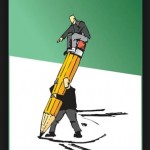 The following is part of an ongoing collegial conversation I’ve been having with Heather, a 2012 graduate student in the MSSE Program. She has spent 18 years as a microbiology laboratory instructor at a Canadian university, but prior to that worked doing molecular microbiology research and clinical virology diagnostics (among other things). She is especially interested in improving the writing of student lab reports and has implemented a peer editing process in her courses. Recently she reflected on HER experience as a student in the MSSE Program and how she personally used peer editing for her Capstone Paper.
The following is part of an ongoing collegial conversation I’ve been having with Heather, a 2012 graduate student in the MSSE Program. She has spent 18 years as a microbiology laboratory instructor at a Canadian university, but prior to that worked doing molecular microbiology research and clinical virology diagnostics (among other things). She is especially interested in improving the writing of student lab reports and has implemented a peer editing process in her courses. Recently she reflected on HER experience as a student in the MSSE Program and how she personally used peer editing for her Capstone Paper.
Heather is currently the facilitator of the online Capstone Forum for the 2013 MSSE graduate candidates. Here’s Heather’s advise to current students in the MSSE Program:
Heather: One thing I found in the course of my own capstone research was that peer feedback can be just as or more effective than instructor feedback. With my ongoing data collection last term (yet unpublished), I suspect part of the reason is that my students actually look at and consider peer feedback, but look only at instructor comments insofar as needed to explain the grade earned (despite their comments to the contrary).
So, how does this apply to you?
First, I’d encourage everyone to have at least one peer or colleague look over your paper. I had seven people read my entire capstone (three work colleagues, one high school teacher, two scientists and my mom) and each one of them helped to correct grammar and spelling errors and gave me valuable insights I could use. If you don’t want to overwhelm your friendly reviewer(s), consider having them read each section as you complete it.
Second, and this can really help if you’re suffering from “writer’s block:” go over all iterations of your paper that you’ve submitted to your project advisor. Make sure you have corrected everything that needs to be corrected, as your advisor likely won’t be looking much at details in sections they’ve already looked at. I felt I was accomplishing a lot when I went through and corrected errors and it gave me confidence that I was creating a better paper each time I did so.
Ultimately, now that capstone papers are archived and available online, your capstone will be widely available for all to see, so it reflects badly on both you and the MSSE program if it contains errors in formatting, grammar, organization or content.
John: One thing that strikes me is Heather’s observation that students are often LESS interested in the instructor’s comments than the grade. Even at the graduate level, where LEARNING should be top priority, the quest for an A prevails. The ultimate goal of the Capstone Paper in the MSSE Program is a professional document that reflects the research project that the student completed. It is archived in the MSU library, so high standards of writing, formatting and overall rigor are expected. As a Project Advisor, I spend countless hours (no fewer than 25 hours per paper over nearly 18 months of coursework) editing and providing feedback. I share Heather’s frustration that some students resubmit papers after receiving my comments without any corrections, and her advise to review all iterations of the paper before pressing the final submit button is critical. Her suggestion to use peer feedback, exposing her paper to “another set of eyes” of critical friends is salient.
Upcoming in a future post: Part of Heather’s MSSE Capstone paper explored the effectiveness of the use of Peer Editing in lab write-ups. She and I will discuss that soon.
